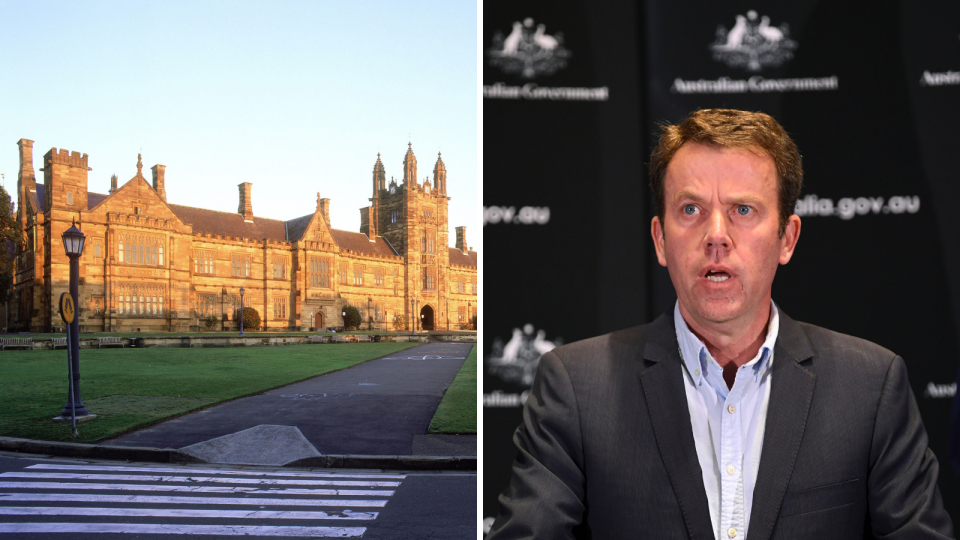Students cop $21,000 fine for protesting university fee hikes

NSW Police have issued fines to 21 university students who took part in a protest at the University of Sydney over job cuts and planned university fee hikes.
Around 200 people attended the Broadway protest, breaking NSW’s Covid-19 rules that prevent outdoor gatherings of more than 20 people.
The protestors moved through the University of Sydney grounds at around 1:30pm and obstructed traffic by sitting down on City Road, according to NSW Police.
Protestors were objecting to the Education Minister Dan Tehan’s proposed fee hikes that would see the cost of some degrees double while others would reduce in price in a bid to funnel students into industries that the government believes will stimulate the economy.
The protest was also in the face of job cuts, which have seen more than 11,000 jobs lost in the university sector across the nation.
A similar demonstration was held last Wednesday, after which more than 100 staff at the University of Sydney signed an open letter accusing NSW Police of “political censorship” as the protestors were never in groups of more than 20.
“Meanwhile, contact sports, shopping malls, public transport … are all up and running, with the public encouraged, but not required, to wear face masks,” the letter said as reported by The Guardian.
“At the University of Sydney, we are now allowing face-to-face, indoor tutorials of up to 30 students at a time.”
Yahoo Finance has reached out to Tehan’s office for comment.
A spokesperson for the University of Sydney said the institution “strongly defend[s] freedom of speech and support[s] the right of our students and staff to express their views in a legal, safe and respectful way”.
“This year we’ve regularly engaged with our student representatives and staff unions, and encouraged them to develop COVID safe plans for events in line with NSW Health advice and to liaise directly NSW Police,” the spokesperson said.
“We have our own crowd management protocols, which aim to ensure a safe environment for all events including protests. However, NSW police make their own decisions under the Public Health Order to be on campus and take action as they deem necessary in the interest of public safety.
“The Vice-Chancellor has also written to the police about their response to recent protests on campus.”
What are the uni reforms?
In mid-June, Education Minister Dan Tehan announced that the government was “incentivis[ing]” students to pay less for their degree if they studied “areas of expected employment growth”.
The reforms mean that those who want to study agriculture or maths will pay 62 per cent less; those who want to study teaching, nursing, clinical psychology, English and languages will pay 46 per cent less; and those who want to study health, architecture, environmental science, IT or engineering will pay 20 per cent less.
But it also brings up the cost for other students: those who pursue a degree in the humanities will pay more than double (113 per cent) while law and commerce students see a 28 per cent hike in fees.
‘Perverse, unintended consequences’: Top universities
The proposed education reform, which is now in draft legislation, received criticism from unions, universities and research organisations alike.
In a submission in response to the draft legislation, eight of Australia’s most prestigious universities called for the legislation to be referred to a Senate committee for greater consideration.
“With Group of Eight universities facing a $2 billion revenue downgrade in 2020 and most likely worse to follow in 2021, because of Covid-19 restraints, we must ensure that the education of students and their graduation is protected, and any potential changes approached with sensible caution, a strong evidence base, and full consultation,” the submission stated.
The Group of Eight (Go8) also slammed the Federal Government for stifling genuine debate on university reforms by providing less than a week for consultation and comment on the draft legislation.
“Given the importance of this reform, the Go8 must admit the abbreviated consultation on the legislation appears constructed to effectively disable genuine and desirable collaboration and consultation occurring to assist Government negotiate the complexity of implementing [Job-Ready Graduate] measures.”
Govt reforms will slash $900 million in uni funding
Analysis from independent research organisation Bankwest Curtin Economics Centre (BCEC) found the reforms would slash the university sector’s overall funding by $900 million.
BCEC analysis revealed that student contributions will come to more than $800 million, but that this will still leave an overall shortfall of $900 million if the government pulls funding from some courses.
“Most courses will have lower total funding overall relative to current median costs, with the exception of Medicine and Agriculture,” wrote BCEC research fellows Rebecca Cassells and Steven Bond-Smith.
“Student contributions have increased substantially for a number of courses. This includes the Society and Culture disciplines, which comprise of Law and Economics, History and Sociology and Philosophy and History.”
The National Union of Students also said lowered fees, while good for some students, came at the expense of others.
“We need funding, not attacks on students,” said the union in a statement.
“Universities are not job factories and tailoring fees around that premise will hurt our sector in a time where we are already facing billions of dollars lost and hundreds of staff cuts.
“Being a student should not be a debt sentence, but the Government has decided to force tomorrow's workers into a lifetime of further debt.”
Make your money work with Yahoo Finance’s daily newsletter. Sign up here and stay on top of the latest money, economy, property and work news.
Follow Yahoo Finance Australia on Facebook, Twitter, Instagram and LinkedIn.

 Yahoo Finance
Yahoo Finance 
